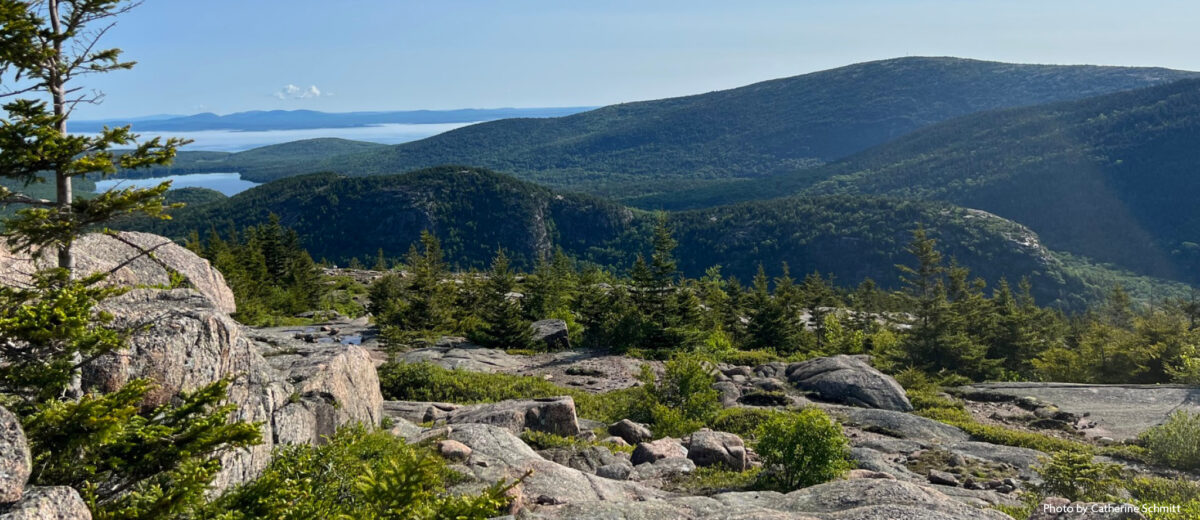Save the Date!
The 2024 Acadia National Park Science Symposium will take place on October 1st, 9th, and 10th at Schoodic Institute. Check back here later this spring for more details and registration information.
Hosted by Schoodic Institute and the National Park Service, the Acadia National Park Science Symposium provides a forum to learn about science taking place in the region and to interact and build collaborations with scientists, educators, students, park staff, and others working in a range of fields.
The theme of this year’s symposium is 25 Years of Impactful Research in Acadia National Park. The symposium will highlight some of the most influential science, science communication, and education that has happened in Acadia National Park since the start of the Research Learning Center (RLC) 25 years ago. In 2000, the National Park Service began working with community members to create an RLC on the campus of the former Navy Base in Winter Harbor. The goal of Schoodic Institute (Acadia’s Research Learning Center) is to help grow science in national parks and better connect science with management, education, and communication. Since the establishment of Schoodic Institute, the amount of annual research in the park has increased more than threefold. This year’s science symposium will highlight some of the most influential examples of research, education, and communication that has happened over that time.
The symposium will take place in-person at Moore Auditorium on the Schoodic Institute campus (Winter Harbor, ME) and online via Zoom. This virtual option is open to speakers and attendees alike. Please note that there will be overnight accommodations available. Stay tuned for registration and the full speaker agenda, which will be announced later this spring.
The 2024 symposium agenda:
Tuesday, October 1 (virtual only): What Drives Early-Career Environmental Science Professionals? Why do we do this work? Gain insights as they present their perspectives in a series of five-minute lightning talks. Learn more here.
Wednesday, October 9 (in-person and virtual): Evening lecture featuring keynote speaker Dr. Ray Sauvajot on Science for Natural Resource Stewardship: the Key Role of Partnerships and Collaboration in National Parks. Sauvajot serves as Associate Director for Natural Resource Stewardship Science for the National Park Service. Learn more here.
Thursday, October 10 (in-person and virtual): A full day of symposium events, including speaker sessions, networking opportunities, poster sessions, and lunch at Schooner Commons (included in registration). Learn more here.
2023 Symposia
Restoration in Acadia National Park and Beyond
The 2023 agenda:
Wednesday, October 11th from 10am – 12pm (online only): What Drives Early-Career Environmental Science Professionals? Gain insights from their perspectives as they share their inspirations in a series of 5-minute lightning talks. Attend online via Zoom.
Tuesday, October 17th from 7pm – 8:30pm (in-person and online): Keynote speakers Bill Zoellick and Mike Pinkham on Community Science: Building the Capacity to Adapt to Change. Attend in-person at Moore Auditorium on the Schoodic Institute campus or online via Zoom.
Wednesday, October 18 from 8:45am – 4:00pm (in-person and online): Enjoy a full day of symposium events, including three speaker sessions focused on salt marshes, Indigenous science, and moving forward, as well as two poster sessions and lunch. Attend in-person at Moore Auditorium on the Schoodic Institute campus or online via Zoom.
2022 Symposia
Research in Acadia Then & Now
The 2022 agenda:
Bass Harbor Head and coastal forests
Bik Wheeler, NPS, Acadia National Park
Jay Wason, University of Maine
John Daigle, University of Maine
Otter Cliffs, Schoodic Peninsula, and the intertidal
Seth Benz, Schoodic Institute at Acadia National Park
Chris Petersen, College of the Atlantic; Hannah Webber, Schoodic Institute at Acadia National Park; Durlin Lunt, Town of Mount Desert
Frenchman Bay’s marine ecology
Michelle LaVigne, Bowdoin College
Lauren Ross, University of Maine
Chris Sockalexis, Tribal Historic Preservation Officer, Penobscot Nation
Stephanie Spera’s pre-symposium lecture is available here.
Supplemental materials:
Posters and proceedings are available here. (National Park Service)
Intertidal Research in Acadia
Wednesday, March 2, 2022
This daylong virtual session included four panels of invited speakers covering National Park Service priorities, broad-scale research across the intertidal, and research specific to the rocky intertidal and soft sediment intertidal zones.
Draft Agenda (PDF version)
Presentation on evaluation of Acadia intertidal zone workshops to date (link to recording)
Visitors to Acadia (link to recording)
Tuesday, February 22, 2022
This session featured presentations by Laura Cohen, Acadia National Park Visitor Experience and Education, and Adam Gibson, Acadia National Park Social Scientist.
2021 Symposia
Early Career Opportunities in Acadia National Park
Thursday, December 9, 2021
The Resist-Accept-Direct (RAD) framework helps managers make informed, purposeful choices about how to respond to the trajectory of environmental change and supports collaborations across large landscapes. This symposium will feature speakers discussing RAD-informed projects in two national parks, and will include Indigenous perspectives from both areas. After the presentations, breakout group discussions will address questions to help identify obstacles to making RAD decisions and practices that may help managers and researchers use this approach at other locations.
Featuring:
- Status of RAD thinking in NPS, Gregor Schuurman, National Park Service, Climate Change Response Program
- Examples in Acadia National Park, Abe Miller-Rushing, National Park Service, Acadia National Park, and Nick Fisichelli, Schoodic Institute at Acadia National Park
- Wabanaki perspectives on climate adaptation, Darren Ranco, University of Maine
- Examples in Bandelier National Monument, Scott McFarland, National Park Service, formerly at Bandelier National Park (currently at NPS Natural Sounds and Night Skies)
- Pueblo perspectives on climate adaptation, Kai-t Blue-Sky, Pueblo of Cochiti
Link to recording and supplemental materials:
Resist-Accept-Direct (RAD)—A Decision Framework for the 21st-century Natural Resource Manager (National Park Service)
Announcing the Resist-Accept-Direct framework (Schoodic Institute)
National news coverage of the RAD framework (Schoodic Institute)
2020 Symposia
An overview of research in the park in 2020
Monitoring change in Acadia National Park
Workshop: Early career opportunities and internships in Acadia
Adapting to the Future
Wabanaki knowledge, perspectives, and science in Acadia
Workshop on research permits, reporting, data sharing, and science communication
Past Symposia
2018 Acadia Science Symposium Proceedings and Presentations.

